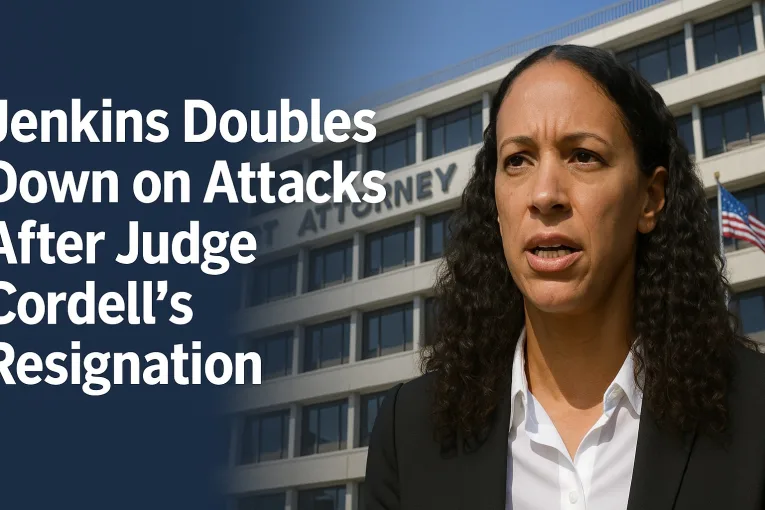
SAN FRANCISCO — In a series of social media posts, San Francisco District Attorney Brooke Jenkins doubled down this week on her public attacks against retired Judge LaDoris Cordell, following Cordell’s resignation from the San Francisco Innocence Commission.
Jenkins’ combative response laid bare the growing political divide over judicial independence, prosecutorial ethics, and transparency in San Francisco’s legal system—and beyond.
Cordell, a retired judge with decades of experience, issued a scathing resignation letter citing Jenkins’ “shameful and unethical” public attacks on sitting judges. She accused the District Attorney of endangering judicial independence and the safety of judges through inflammatory statements and social media posts designed to score political points.
“The place for a prosecutor to disagree with a judge’s ruling is in the courtroom, not on social media and not in the streets pandering to voters,” Cordell wrote, referencing incidents where Jenkins publicly condemned judicial decisions and even joined protests outside the courthouse that led to death threats against a judge.
In response, Jenkins took to X (formerly Twitter)—the very platform Cordell criticized—to dismiss the judge’s concerns and instead suggest Cordell was motivated by politics, not principle.
Jenkins accused Cordell of hypocrisy, questioned her support for judicial transparency, and claimed Cordell’s resignation reflected her allegiance to former DA Chesa Boudin. Jenkins even posted a photo of a Chesa Boudin campaign rally to drive home the point.
Yet critics argue that Jenkins’ response only reinforced the dangers Cordell outlined—the growing politicization of the prosecutor’s office and the undermining of judicial independence in the name of populist posturing.
Jenkins’ attempt to smear Cordell by linking her to Boudin ignores the judge’s long record of judicial service and her leadership on the Innocence Commission, which reviews wrongful conviction cases.
Legal experts say Jenkins’ escalating feud with the judiciary raises serious concerns about the impartiality of the DA’s office.
“What’s deeply troubling is not just the personal attacks on a retired judge, but the way Jenkins is using her official position to intimidate judges and discredit critics,” said a longtime legal analyst. “That’s not about transparency—it’s about power.”
Jenkins’ claim that Cordell’s resignation reflects a refusal to support “judicial transparency” also rings hollow to many observers. Nowhere in Cordell’s resignation did she argue against transparency—rather, she condemned Jenkins’ public scapegoating of judges for political gain, particularly in a city grappling with complex issues like drug addiction and property crime.
Cordell detailed multiple examples of Jenkins publicly berating judges—accusing them of coddling drug dealers, treating property crime lightly, and disregarding voter intent. One of the most egregious examples, Cordell wrote, was Jenkins’ participation in a protest that ultimately led to a judge receiving death threats.
“For a sitting district attorney to fuel outrage against a judge to the point of endangering their life is beyond irresponsible—it’s dangerous,” said the analyst.
The episode also exposes the ongoing political fault lines left behind after the 2022 recall of Chesa Boudin. Jenkins, who rose to power backed by recall proponents, has frequently used Boudin as a foil. But critics argue that invoking Boudin’s name to deflect from legitimate concerns—including those raised by a retired judge—is a distraction tactic.
“This isn’t about Chesa Boudin. This is about basic norms of prosecutorial conduct and judicial independence,” said a civil rights attorney. “Brooke Jenkins crossed the line—and when she was called out, she chose to double down rather than reflect.”
Cordell’s departure is a loss for the Innocence Commission, a body tasked with ensuring that the wrongfully convicted have their cases reviewed. Her exit—driven by concern over Jenkins’ behavior—raises new questions about whether the DA’s office can maintain the commission’s integrity under such politically charged leadership.
“Judicial independence is the hallmark of a democracy,” Cordell wrote. Jenkins’ ongoing social media attacks suggest she either doesn’t understand that—or simply doesn’t care.
